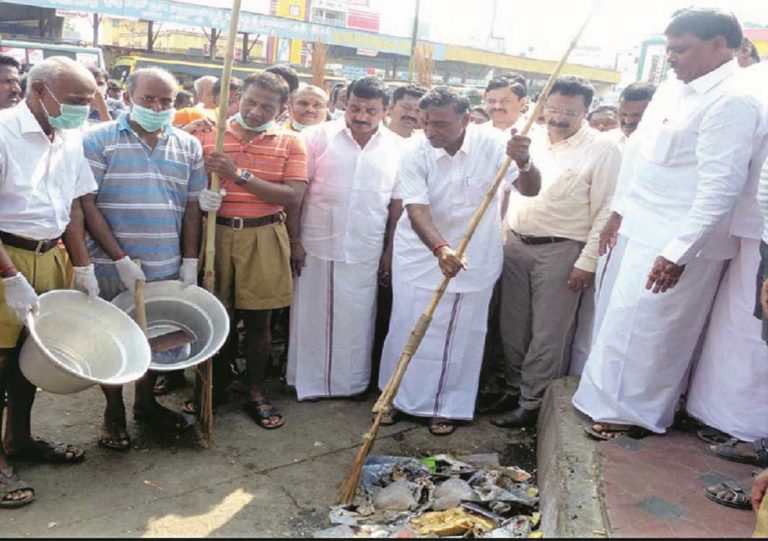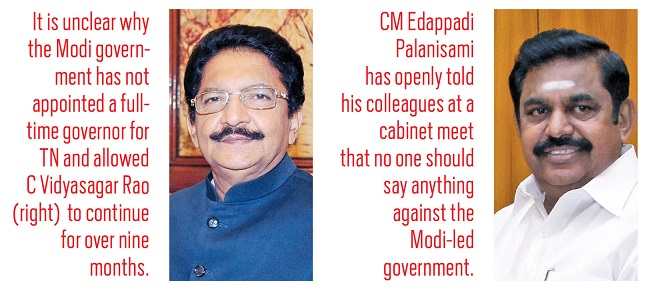
BJP is slowly and surely making its moves in Tamil Nadu, and the release of Dinakaran, Sasikala’s nephew, recently will only add to the political machinations taking place in the state
~By R Ramasubramanian in Chennai
The saffron surge continues. While the BJP made inroads into many states, including those where the Congress had a majority in the assembly elections this year, in Tamil Nadu, it still has to make a dent. But it is trying and how.
With the untimely death of former chief minister J Jayalalithaa and the breaking up of the AIADMK into various factions, the road to power seems easier for the BJP which got just 5 percent of the votes in the state in 2014. Power-hungry politicians in Tamil Nadu too have played a shameless game of avarice and cunning, and allowed the BJP to make an entry. The arrest of TTV Dinakaran, Sasikala’s nephew, in this game, had given a boost to the BJP’s ambitions in this southern state, though in a surprising twist of fate, he and an aide were released on bail on May 31.
GROWING CLOUT
The BJP’s growing clout in Tamil Nadu can be gauged from the fact that on May 14, Union Minister for Information and Broadcasting M Venkaiah Naidu chaired a meeting of the cabinet at the Tamil Nadu secretariat. The reason cited was that Naidu wanted to know the status of centrally funded projects in Tamil Nadu.

MG Devasahayam, a former chief secretary of Haryana, said: “A union minister chairing a state government’s cabinet meeting at the concerned secretariat is unheard of. This is to belittle the Tamil Nadu chief minister and show him that the real boss is Naidu. Nowhere in the country does a Union minister visit state secretariats and hold discussions on any subject. They are held in state guest houses or hotels.”
The BJP’s growing clout in TN can be gauged from the fact that Union Minister M Venkaiah Naidu chaired a meeting of the cabinet at the Tamil Nadu secretariat.
Also, greater political legitimacy is being given to the RSS in Tamil Nadu. On May 13, Tamil Nadu’s Higher Education minister KP Anbazhagan inaugurated a clean-up drive organised by the RSS at Dharmapuri bus stand, a backward area of the state. The very fact that a state minister shared the dais with RSS functionaries raised many eyebrows. However, Anbazhagan said: “I belong to Dharmapuri and I was invited to launch the clean-up drive. Since they (RSS) have done good work for the past 20 days, I said they should be encouraged for mass-cleaning activities.”
Meanwhile, there have been reports of superstar Rajnikanth wanting to float his own political outfit and joining hands with the BJP later. The BJP too, it seems, is not averse to this and would wait for a larger alliance later. The situation is very fluid.
Even acting governor C Vidyasagar Rao has taken on larger powers. Recently, Rao personally conducted interviews for the appointment of vice-chancellors in three state universities. While he selected V-Cs for two universities, he appointed former Supreme Court judge RM Lodha as the convener of a search committee which would choose a V-C for Anna University in Chennai. His role in Tamil Nadu should be seen in the context of developments which took place after Jayalalithaa’s death.
Another related development took place on January 29 when an RSS procession was allowed in Chennai, when O Panneerselvam was the CM.
“The last time an RSS procession was allowed in Chennai was 16 years ago. Whether it was the Jayalalithaa government or the Karunanidhi one, both the Dravidian parties did not allow any RSS procession. One can well understand the way the AIADMK government is tilting nowadays,” said R Kannan, a senior journalist.
CHANGED SCENARIO
It all started to unravel after Jayalalithaa’s death in December 2016. On February 5, 2017, the AIADMK, with 136 MLAs in the 234-member House, elected Sasikala (Jayalalithaa’s close aide and general secretary of the party) as its new legislature party leader. This led to then CM O Panneerselvam sending his resignation to Governor Rao, who is also the governor of Maharashtra. It is unclear why the Modi government has not appointed a full-time governor for Tamil Nadu and has allowed Rao to continue here for over nine months. This is unheard of in the history of Tamil Nadu.
The fall and rise of Dinakaran, Sasikala’s nephew, has taken many by surprise. This AIADMK Amma leader was accused of bribing an Election Commission official to get the AIADMK’s “two leaves” symbol for his faction and was arrested by the Delhi police on April 25.
A longtime friend of his, Mallikarjuna, too was arrested. He and his aides were accused of striking a Rupees 50-crore deal to get the symbol.
But in a surprising development on May 31, Dinakaran and Mallikarjuna were granted bail by a special court in Delhi, saying they were no longer required for custodial interrogation and should not try to influence the witnesses or tamper with evidence. The bail was opposed by the crime branch which said Dinakaran had conspired with others to undermine the sanctity of the electoral process.
They probably had their reasons, considering Dinakaran’s past. He has had run-ins with the Enforcement Directorate in the past and has had three FERA cases slapped against him. All three are still pending before a local court in Chennai.
Panneerselvam then revealed to the media that he was pressurised by a faction supporting Sasikala to submit his resignation. On February 9, Sasikala and Dinakaran met the governor and staked her claim to form a new government. But Rao did not take a decision.
And on February 14, the Supreme Court gave its judgment in the disproportionate assets case against Jayalalithaa, Sasikala, Ilavarasi (Sasikala’s deceased brother’s wife) and Sudhakaran (Sasikala’s nephew). It sentenced Sasikala and two others to four years of imprisonment. On February 16, Edappadi Palanisami, a Sasikala loyalist, was sworn in as CM and won a confidence vote on February 18.
MAJOR INFIGHTING
Meanwhile, the EC announced that the bypoll to the RK Nagar constituency, which fell vacant after the death of Jayalalithaa, would be held on April 12. The Panneerselvam faction requested the EC to allot the AIADMK party symbol, two leaves, to it. However, the EC froze the symbol and warned both sides not to use the name AIADMK. Instead, it gave the name AIADMK (Amma) to the Sasikala faction and AIADMK (Puratchi Thalaivi Amma) to the Panneerselvam faction and allotted new symbols to both sides.
Greater political legitimacy is being given to the RSS in Tamil Nadu. On May 13, Tamil Nadu’s Higher Education minister KP Anbazhagan inaugurated a clean-up drive organised by the RSS at Dharmapuri bus stand, a backward area of the state. The very fact that a state minister shared the dais with RSS functionaries raised many eyebrows.
It is in this context that Dinakaran’s role is important. On April 9, the EC cancelled this bypoll due to massive and open distribution of money to voters. Dinakaran also attempted to bribe the Election Commission in order to retain the party symbol for the RK Nagar bypoll. He was arrested but on May 31, a special court in Delhi granted bail to him and his aide Mallikarjuna, saying they were no longer required for custodial interrogation and should not try to influence the witnesses or tamper with evidence. The bail was opposed by the crime branch, which said Dinakaran had conspired with others to undermine the sanctity of the electoral process.
Dinakaran’s record so far has been none too savoury. He had a run-in with the Enforcement Directorate in February 1996, when the agency filed three FERA cases against him. All three are still pending before a local court in Chennai. It also detained Dinakaran under COFEPOSA (Conservation of Foreign Exchange and Prevention of Smuggling). After elaborate arguments, the ED imposed a Rupees 28-crore fine on Dinakaran in 2000. And it was only recently, after 21 years, that a local magistrate court in Chennai started expediting the trial against Dinakaran in the three FERA cases.
 Dinakaran has been a constant factor in Sasikala’s life. When she went to meet the Tamil Nadu governor to stake claim to the government, she took only Dinakaran along with her. Though he was expelled from the AIADMK by Jayalalithaa on December 19, 2011, he was immediately appointed deputy general secretary just an hour after he sent an apology letter to Sasikala before she started her jail journey to Bangalore.
Dinakaran has been a constant factor in Sasikala’s life. When she went to meet the Tamil Nadu governor to stake claim to the government, she took only Dinakaran along with her. Though he was expelled from the AIADMK by Jayalalithaa on December 19, 2011, he was immediately appointed deputy general secretary just an hour after he sent an apology letter to Sasikala before she started her jail journey to Bangalore.
Considering his inglorious past, the BJP, which wants to be seen as a party with brooks no corruption, would want to have little to do with him. In this battle for turf, the BJP backed Panneerselvam when he took over after Jayalalithaa’s death and has stood by him.
But with Sasikala being sent to jail, both the AIADMK factions are openly supporting Modi. In fact, CM Edappadi Palanisami has openly told his colleagues at a cabinet meet that no one should say anything against the Modi-led government.
As both factions bend backwards to show their loyalty to the Modi government, it may be just a matter of time before the saffron tinge pervades this southern state too.

